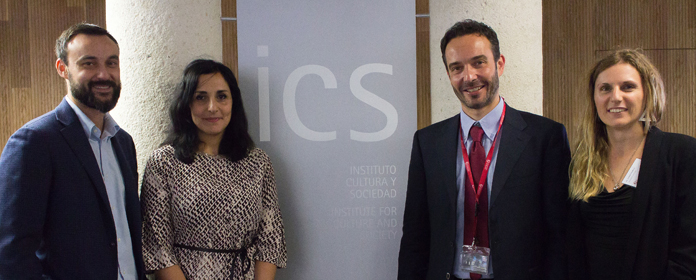"The relevance of Christians to the culture and Economics of the Middle East is very high compared to their issue"
Paolo Maggiolini, researcher Italian Paolo Maggiolini intervened in an ICS of the University of Navarra workshop on the narratives of Islam and Christianity.

PHOTO: María Jesús Ruiz
"Christians have had a dynamic presence in the culture and Economics of the Middle East during the twentieth century and their relevance remains very high compared to their issue". This is what Paolo Maria Leo Cesare Maggiolini, researcher and professor of History of Islamic Asia at the Catholic University of the Sacred Heart (Italy), said at the University of Navarra. The expert intervened in a workshop organized by framework Demichelis, researcher Marie Curie of the Institute for Culture and Society (ICS).
Maggiolini pointed out that "because most Arab states have been founded on certain contradictions regarding the place of religion in the public space and in the state, the presence of Christians has result caged and frozen within the limits, boundaries and spheres of the religious community, at the will of the regimes in power".
For the specialist, "thereis no single story capable of describing the condition of Christians in the history of the Middle East, as well as their role in regional diversity," since "each country has specific characteristics and the local dimension is of predominant importance," he emphasized.
However, he added that "their condition and presence is the best reflection of the status of Middle Eastern societies in general and of the relationship between the different regimes and their people, beyond the sole religious or ethnic factors."
Diversity in the Middle East: Saddam and DaeshPaolo Maria Leo Cesare Maggiolini also referred to the way Saddam and Daesh have dealt with diversity in the Middle East: "Although it is not possible to draw simple similarities between the two, it could be said that both have shown a certain attitude to consider diversity as a possible threat or challenge".
He stated that during the Saddam era, "although there were many political problems in the relationship and specific communities, Iraqi society was plural and intermingled" and he "bet on allowing a place for diversity if it respected his regime, authority and legitimacy."
On the contrary, according to the specialist, "Daesh has clearly projected the assault on diversity as an integral part of its strategy and propaganda: it has exploited, vilified and humiliated it to spread terror and chaos. It has interpreted the assault and extermination of the different as functional." "Daesh does not allow a real place for whoever behaves differently from its ideology. Diversity is politically and ethically unacceptable according to its strict and narrow religious and ideological interpretation," he lamented.
In addition to Maggiolini, on the workshop of the project 'Religion and Civil Society' of the ICS of the University of Navarra were Sara Hejazi, researcher at the department of programs of study Religious at the Bruno Kessler Foundation, who focused on state violence against women in contemporary Iran; framework Demichelis, who analyzed Jihad in the first century of Islam; and Viviana Premazzi, researcher at the department of Cultures, Politics and Society of the University of Turin, who addressed human rights and the prevention of terrorism.




